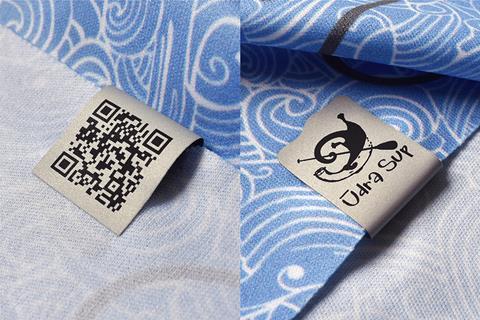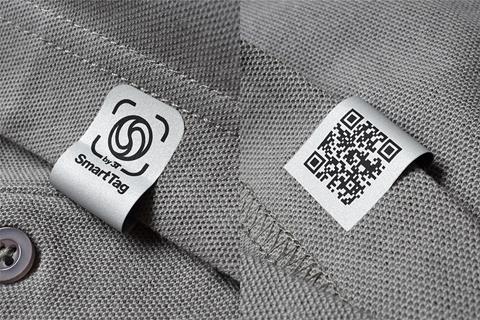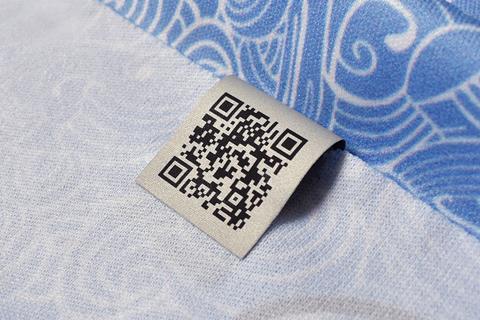In the ever-revolving world of fashion, digital technologies are becoming a driving force behind efficiency, sustainability, and transparency in the supply chain. One such advancement reshaping the garment industry is the Product Pasport (PP). The SmartTag system, developed by 3T, comes with all the functionality of a PP and helps brands to encompass various aspects, ranging from product development to marketing and even garment care questions. We look at five ways the SmartTag system is helping the apparel industry adapt in a changing industry.

SmartTag meets consumer’s shifting needs
Consumer demand for sustainable and ethically produced garments is at an all-time high. The SmartTag can meet this need by allowing companies to provide detailed manufacturing and fabric content information for each garment. Customers can easily access information about the materials used and ethical certifications. This transparency empowers consumers to make choices aligned with their values.
The second key feature of the Product Passport (PP) system is sharing care recommendations with consumers. By reducing the guesswork associated with clothing care and origin, brands can reduce the rate of returns and exchanges, enhancing customer satisfaction and loyalty.
Enabling track and trace for clothing
In the apparel industry, traceability is vital for maintaining product quality and adhering to ethical sourcing practices. The SmartTag system can maintain a track and trace system. SmartTag provides a way to share an end-to-end view of the supply chain, ensuring that manufacturers maintain the highest standards.
From tracking the origin of raw materials to monitoring each step of production, digital systems enable manufacturers to identify and address potential issues promptly. This not only ensures product quality but also supports compliance with international regulations and industry standards. Furthermore, a high-level of traceability enhances transparency, allowing brands to communicate their commitment to sustainability and ethical practices to consumers, building trust and brand loyalty.

Digital solutions like SmartTag offer comprehensive traceability and meet the demands of the environmentally conscious consumer by providing details such as:
- Country of origin: Transparency about where a garment is produced aligns with the growing interest in supporting local industries and knowing the source of one’s products.
- Factory certifications: Brands can proudly showcase their commitment to ethical manufacturing by providing certification details for the factories involved. This fosters consumer trust in a brand’s ethical practices.
- Main body fabric content: Detailed information about fabric composition helps consumers make informed choices based on their comfort preferences, allergies or sustainability concerns.
- Main body fabric country of origin: Knowing the source of the fabric adds another layer of transparency. Some consumers prioritize clothing made from materials produced in regions with strong environmental or social responsibility practices.
Staying one step ahead in case of product recalls
With the SmartTag system, each garment is tracked and followed separately. Each item can be assigned a unique identifier, and have its own digital number in the cloud, with this information reachable through the internet. This allows designers and manufacturers to create intricate digital information that can be updated and adjusted in real-time.
Unique management of garment information also helps follow the lot numbers and production date of a garment. Knowing the exact production date helps in quality control and recalls if necessary. Assigning a unique identifier to each batch of garments allows for quick and precise tracking. If a specific batch exhibits issues or needs to be recalled, this system facilitates targeted actions, allowing unaffected product lines to remain in the supply chain.
A digital solution for managing returns
Managing customer return policies becomes more efficient with the SmartTag system. These systems can automatically log and categorize return requests, enabling companies to identify trends and perhaps underlying issues with products. This data-driven approach enables businesses to make proactive improvements, whether in product quality, sizing, or customer service.
By addressing common issues through data analysis, companies can reduce the rate of returns and improve customer satisfaction. Furthermore, the insights gained can be used to enhance future product development and customer experience strategies.

A digital tool building connection to clothing once more
While developing SmartTag, our goal was not only to design it as a technical tool but also as a conduit that bridges the gap between brands and customers.
Each individual’s wardrobe harbors stories waiting to be told. Heirloom wedding gowns, cherished across generations, or the hoodie that once served as a token of affection. Fashion, in its essence, is a canvas for self-expression, a manifestation of artistic ingenuity, and sometimes, a poignant declaration of our reliance on style. Yet, as the wheels of industrialization spun, clothing metamorphosed into a readily attainable commodity, available at the swipe of a card or the click of a button.
With digitalization, the uniqueness and meaningfulness of the garments we purchase, including an element of personalization, can once again bring added value.
As such, in the digital age, marketing in the garment industry must go beyond traditional advertising and print media. Data analytics and customer insights are now essential tools for crafting effective marketing strategies. By harnessing these digital capabilities, companies can personalize their marketing efforts to a granular level. Using data-driven insights, companies can identify the preferences and behaviors of their target audience, allowing for highly targeted and personalized marketing campaigns. Social media platforms, influencers and e-commerce websites serve as powerful channels to reach a wide and engaged audience. Brands can now interact with customers directly, creating a sense of community and trust.

The digital transformation in the garment industry is a multifaceted shift that encompasses design, marketing, customer care, and traceability. It represents a fundamental change in how clothing businesses operate, emphasizing sustainability, transparency, and customer-centricity.
But this transformation not only benefits companies by improving efficiency and reducing costs, it also empowers consumers to make more informed and ethical choices when it comes to their clothing purchases. Ultimately, it reshapes the garment industry into a more responsible and responsive ecosystem.
Find more information at:
https://smarttag.info/home and
Check out 3T’s website: www.3t.lt or contact them directly for more details at info@3t.lt.










